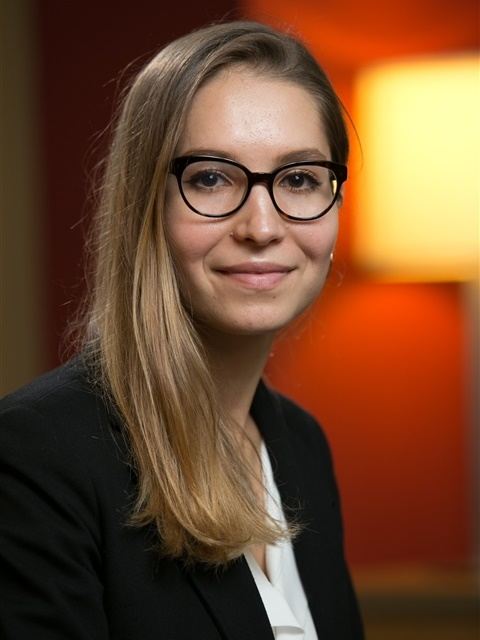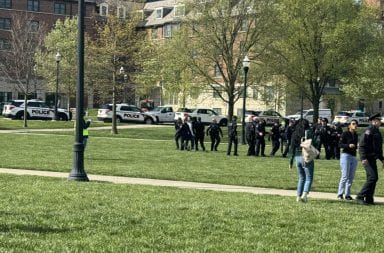
Alina Sharafutdinova, one of Ohio State’s President’s Prize winners, developed the “Ohio Opioid Action Plan” focused on combatting the opioid epidemic in Franklin County. Credit: Courtesy of OSU
Alina Sharafutdinova lost her uncle to a drug overdose when she was 5 years old. She couldn’t possibly have known how that tragedy would shape her future path — one that could soon support those touched by similar tragedies.
Now, Sharafutdinova, who has lived in the U.S. since she was 15 and graduated from Ohio State in December, finds herself as one of two recently announced recipients of the prestigious 2018 President’s Prize — an award given to two graduating seniors who plan to create positive change.
Sharafutdinova, whose bachelor’s degree is in health science, plans to use funding from the prize — comprising of a $50,000 living stipend and $50,000 to be spent on program development — to aid a Central Ohio community afflicted by the opioid addiction epidemic.
The project will take Sharafutdinova to a high school in one of a handful of Franklin County ZIP codes identified by the coroner’s office as high-risk for opioid deaths. Sharafutdinova will work to treat the mental health needs of students in the school and will reach out to community members to help them solve the community’s problems.
The effect of her uncle’s death was a factor that drew Sharafutdinova to the work, she said.
“Once I started looking into this issue, I realized that the project really called me, I think. I was wondering why I chose this project,” Sharafutdinova said. “It’s that my life is a big reflection of the project.”
Part of that reflection was growing up in Uzbekistan, after the fall of the Soviet Union, where she saw how economic instability led to unemployment and widespread drug addiction, even in her own family.
Sharafutdinova’s cousin found himself without a father at age 6.
“My uncle, he struggled with addiction and he overdosed, and my cousin — his son — had to live with that and that’s something that I think I didn’t realize how much of an effect it had on him until I started researching and I really delved into this issue that’s happening right now,” she said. “And I realized the emotional trauma that he experienced losing his father at such a young, tender age.”
Once I started looking into this issue, I realized that the project really called me, I think. I was wondering why I chose this project. It’s that my life is a big reflection of the project. —Alina Sharafutdinova
That research, she said, led her to studies showing that negative effects of traumatic events in children’s lives can be curbed with appropriate mental health care, something she wishes had been available for her cousin, who she thinks to this day exhibits effects of untreated trauma.
“His mental health was never addressed professionally,” Sharafutdinova said. “Not because his family didn’t care, but because it was not a thing to do. No one thought it was necessary. I don’t think they were aware that something like that even exists.”
She said she sees the potential for a brighter future for kids who might now be in similar circumstances.
“I feel for these children who have to go through this every day and in the present day. And I just want to give them the chance that my cousin never had,” Sharafutdinova said. “I’m trying to address this issue early on so they don’t have to struggle with that their whole life. It’s something that I think no child has to go through, to mature in that way.
“Because it really matures you and you become an adult at such a young age. You see death so young and it does something to you.”
To address those needs, Sharafutdinova said she will create a “safe space” in the selected school where students struggling with issues such as addiction in the family will be able to speak with volunteers who will be trained to direct the students to appropriate resources.
For the community outreach part of her mission, Sharafutdinova plans for a communicative collaboration.
“It’s never my intention to go into the community and tell them what to do,” she said. “I would never want anyone to come to me and tell me how to change my life. So it’s going to be a lot of listening and a lot of conversation.”
Listening to others and learning from their perspectives is a particular strength of Sharafutdinova’s, said Diane Habash, an associate clinical professor in the Department of Health Sciences and Medical Dietetics. She also is Sharafutdinova’s faculty mentor for the project.
“This is a really smart woman you’re talking about,” Habash said. “She recognizes that she doesn’t have 100 percent perspective and she always asks for help. She is so humble. She always says, ‘What else is here that I should be thinking about? What else do you see?’”
Having resources like Habash to provide knowledge and encouragement is something Sharafutdinova is deeply grateful because, she said, she didn’t have the same level of encouragement during the 15 years she lived in Uzbekistan.
“The difference became striking when I came to the United States and when I went to [Dublin Jerome] high school here,” she said. “My teachers were encouraging me even though when I was in eighth grade, my teacher back in Uzbekistan told me that I couldn’t do physics or I couldn’t do math because my brain was more structured for, like, languages. So it was a learning experience for me to realize that I can do anything.”
Sharafutdinova said she developed a passion for science during her high school anatomy class, where she “fell in love” with learning about biology and physiology.
“As I started kind of exploring this idea of maybe going into medicine or going into science, I’ve just had a lot of support from all over the place, from my parents, from my friends, from my teachers. And I think that really strengthened my passion,” Sharafutdinova said.
Ultimately, she plans on taking that passion to medical school, but first she has a lot of work to do in a struggling community.
“The project itself is for a year,” Sharafutdinova said. “But the big part of my thinking is to make it sustainable. I don’t want to kind of raise the dust and then leave.”
The Engaged Scholars logo accompanies stories that feature and examine research and teaching partnerships formed between The Ohio State University and the community (local, state, national and global) for the mutually beneficial exchange of knowledge and resources. These stories spring from a partnership with OSU’s Office of Outreach and Engagement. The Lantern retains sole editorial control over the selection, writing and editing of these stories.



